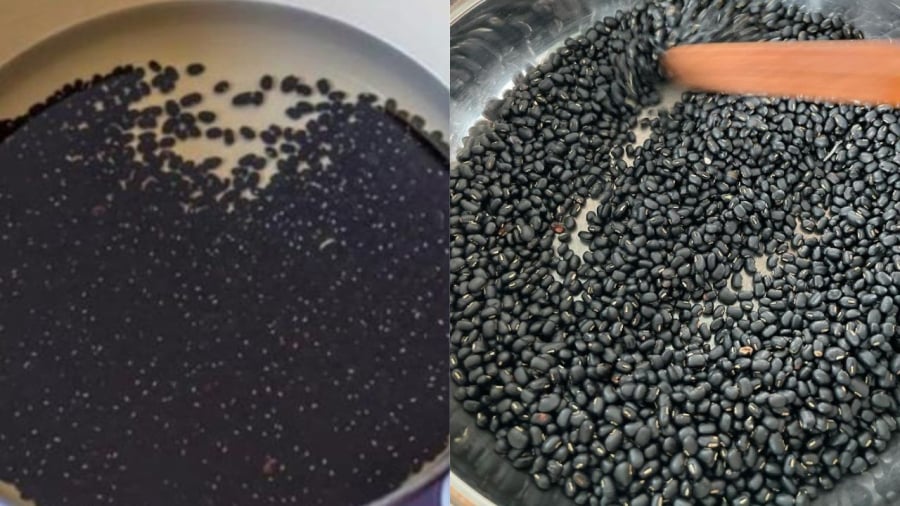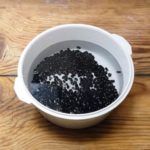Black beans are a highly nutritious food that is especially popular during the summer months. Beyond their use in desserts, drinks, and cooling dishes, black beans are renowned for their myriad health benefits. However, to maximize their nutritional value and avoid any undesirable side effects, knowledgeable home cooks often share a secret tip: soaking and roasting black beans before cooking. But why are these two steps so important? Let’s delve deeper into this topic in the article below.
1. Benefits of Soaking Black Beans Before Cooking
Softer beans for faster cooking: One of the most common reasons for soaking black beans is to soften them, thereby reducing the cooking time. When soaked in water for 6-8 hours or overnight, the beans absorb moisture, expand, and become tender. This not only saves fuel but also prevents the loss of nutrients due to prolonged cooking.

Removal of anti-nutrients: While black beans are highly nutritious, they, like many other seeds, contain phytic acid and other anti-nutrients that can hinder the absorption of essential minerals like iron, zinc, and calcium. Soaking dissolves these compounds into the water, minimizing their negative impact on the body’s ability to absorb nutrients. Thus, soaking is a great way to ensure nutritional safety.
Reduced bloating and improved digestibility: Black beans contain oligosaccharides, complex sugars that can be difficult to digest and may cause bloating and flatulence if consumed in large quantities. Soaking black beans before cooking helps remove these sugars, making the beans easier to digest, even for those with sensitive digestive systems.
2. Why Roast Black Beans Before Cooking?
Enhanced flavor and color: Roasting black beans intensifies their distinctive aroma and flavor. When used for brewing drinks or making desserts, pre-roasted beans yield a darker, more appealing brown liquid with an enticing aroma. This is one of the key techniques employed in preparing a cooling and detoxifying black bean drink.
Retaining nutrients: Lightly roasting the beans before cooking helps seal in the nutrients during the cooking process. Additionally, dry roasting deactivates unfavorable enzymes and reduces the presence of naturally occurring harmful antioxidants in the beans.
Roasting also mitigates the cooling properties of black beans, making them more suitable for individuals prone to cold stomachs.
Longer shelf life: Roasting beans before cooking or storing helps reduce moisture and eliminate bacteria, mold, and other microbes that may be present in raw beans. If you plan to store beans for an extended period, a light roast is an excellent way to ensure they remain dry, mold-free, and insect-free.
3. Guide to Soaking and Roasting Black Beans Properly
a. How to Soak Black Beans
Rinse the black beans and remove any damaged, shriveled, or defective beans.
Soak the beans in clean water for 6-8 hours or overnight. Adding a pinch of salt can aid in the cleaning process. In hot weather, change the water periodically to prevent fermentation.
After soaking, rinse the beans again and drain them before cooking or roasting.

b. How to Roast Black Beans
Place the drained beans in a dry pan and turn on the heat to low.
Roast the beans evenly for about 10-15 minutes, until they emit a pleasant aroma and their skins begin to crack slightly.
Avoid over-roasting, as this may compromise the nutritional value or produce harmful substances.
Once roasted, allow the beans to cool before using them for cooking or storing them in an airtight container in a cool, dry place.
4. Precautions When Using Black Beans
Individuals with a cold constitution, cold hands and feet, or low blood pressure should consume black beans in moderation to avoid potential adverse effects.
Do not combine black beans with dairy products or spinach, as these foods may interact negatively.
When drinking black bean water daily, it is advisable to consume it warm and not to keep it overnight. It is best to limit consumption to 300-500ml per day.
Soaking and roasting black beans before cooking is not just a culinary trick but also a way to safeguard your health and maximize the nutritional benefits of this versatile legume. By soaking the beans, they become softer, more digestible, and easier for the body to absorb nutrients from. Roasting, on the other hand, enhances the flavor, color, and shelf life of the beans. Whether you’re preparing desserts, drinks, or savory dishes, don’t skip these two crucial steps. A little extra effort goes a long way in ensuring numerous benefits for your family’s well-being!
The Tea Seller’s Secret: The One-Step Method to Soft, Fragrant Black Beans in 10 Minutes
For generations, the art of brewing the perfect cup of Vietnamese black bean dessert soup has been a closely guarded secret. But now, a seasoned dessert soup vendor spills the beans on how to achieve that elusive creamy, nutty flavor with a simple trick. Forget the tedious hours of soaking and simmering – with this hack, you’ll have a dessert soup that tastes just like the pros’ in just 10 minutes.
































